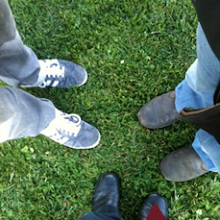One good thing about writing a blog is Google.
Google is a thing and a verb.
The thing is a search engine.
The verb is to find something on the Internet using the Google search engine. There is another definition for the google that has little to do with the search engine.
What that thing is is a number, only it's spelled googol.
It's a huge, long number.
1 with 100 zeros.

But back to Galileo:
Google uses a fancy logo on special days and on this day Galileo created his telescope, not the first ever telescope, but his own and it could see things unseen before. He saw so much that his finding were found awry of the Catholic Church's doctrine.
He was fascinated by the forces of nature; whether ice was heavier than water and why objects always fall to earth. By dropping balls of different weight from a height, Galileo proved that objects fall at the same rate of acceleration. The Royal Professor had prefigured Newton's theory of gravity by 500-years.
Galileo's hunger to observe was fed by a magnificent new invention, the astronomical telescope. Contrary to all contemporary knowledge, Galileo realized the moon was not the pure, white, heavenly body of Church doctrine.Galileo was the first to discover the sun had spots; the first to notice the unusual shape of Saturn; and to identify the Milky Way.
Politically astute, Galileo christened the previously unknown moons of Jupiter after the Medici, who in turn made Galileo the most famous scientist in the world.As long as his patrons were entertained, Galileo was a safe man, although he was living in dangerous times.
The Roman Inquisition could investigate any suspicion of heresy including Galileo's unorthodox ideas. To contradict the Church was suicide, as his friend Giordano Bruno found when he announced that the universe was infinite. In 1610 Bruno was burned alive.
For more than 1,000-years, the Church had taught that the sun and all the planets revolved around the earth. But Galileo came to the radical conclusion that the earth in fact revolved around the sun. He had a choice: protect himself or publish what he knew to be true.
He chose to publish because “I do not believe that the same God who has endowed us with senses, reason and intellect has intended us to forgo their use. He would not require us to deny sense and reason.”Galileo prepared a subtle argument, in the form of a conversation between three friends discussing the structure of the universe.
The resulting bestseller, the “Dialogue of the Two World Systems” was dedicated to his student and patron, Grand Duke Ferdinando II de Medici. Galileo had written the first book of popular science.
The Pope decided that enough was enough. Despite Ferdinando's pleas on his behalf, Galileo was summoned to face the inquisition in Rome. Pope Urban VIII issued a straightforward threat to the Duke. If he carried on supporting Galileo, his own life in Tuscany could become very uncomfortable.
Galileo arrived in Rome in 1633. Interrogated for months and threatened with torture, he resisted all pressure to recant, until Ferdinando II stopped paying his expenses. The Grand Duke put the survival of his dynasty before his promise to one man.On June 21 1633, Galileo denied what he knew to be true: “I still hold, as most true and indisputable, the stability of the Earth, and the motion of the Sun. I am in your hands. Do with me what you please.”Galileo was sentenced to house-arrest and died a broken man in 1642. The remorseful Ferdinando planned a huge memorial, but the Church over-ruled him again.
Galileo’s abjuration
I, Galileo … seventy years of age,
… kneeling before you Most Eminent and Most Reverend Cardinals Inquisitors … swear that I have always believed, I believe now, and with God's help I will believe in the future all that the Holy Catholic Church holds, preaches, and teaches. … I published a book in which I treat of this already condemned doctrine and adduce very effective reasons in its favour…;
therefore, I have been judged [by the Holy Office] vehemently suspected of heresy. … Therefore desiring to remove from the minds of Your Eminences … this vehement suspicion … with a sincere heart and unfeigned faith I abjure, curse, and detest the above-mentioned errors and heresies, … and I swear that in the future I will never again say or assert, orally or in writing anything which may cause a similar suspicion about me. … I submit myself to all the penalties and punishments imposed and promulgated by the sacred canons ands other particular and general laws against similar delinquents …
And in witness of the truth I have signed with my own hand the present document of abjuration and have recited it word for word in Rome, at the convent of the Minerva, this twenty-second day of June 1633.
I, Galileo Galilei, have abjured as above, by my own hand.
It took the Vatican until 1992 to declare they had made a mistake.
Galileo had been right all along.


2 comments:
I think it was the Spanish Inquisition--a political arm of the monarchy--much like the growing number of Czars in today's administration.
Peer pressure is powerful. Raise hands rather than standing out. Fake piety rather than question. But Galileo never condemned the Church.
Interesting factoid--more people were murdered on 9/11 than were killed in the entire (Spanish) Inquisition!
I tried not to be anonymous but that's how the form went. It's toccata or toccatamundi.
Post a Comment